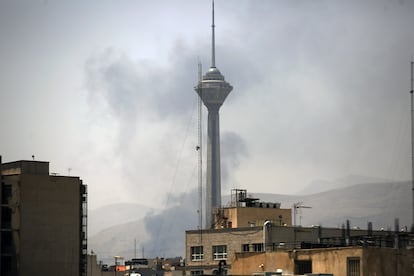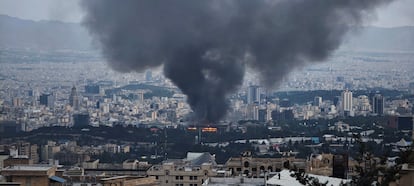Israel urges evacuation of Tehran and bombs Iranian television
Israel and Iran escalate their conflict with evacuation orders in Tehran and Tel Aviv


Israel and Iran are preparing fresh attacks that threaten to escalate the conflict between the two countries. In a measure already implemented by Israeli troops in Lebanon and Gaza, and which is illegal under international law, the Israeli army has issued an “urgent” order to the citizens of Tehran, specifically in District 3, to leave immediately because they are planning to launch air strikes. “In the coming hours, the Israeli army will operate in this area to attack infrastructure [...] Your presence in this area endangers your life,” a military spokesperson said on social media.
As an additional measure, Israeli forces have attacked Iranian public television. In a kind of cat-and-mouse game, Tehran has responded, as it did with missile strikes on Israeli territory, by issuing an evacuation order of its own for the residents of an area of Tel Aviv through the Revolutionary Guard. The order refers to Bnei Brak, a stronghold of Orthodox Jews near where a projectile landed, killing a woman and destroying a building, last Saturday.
In parallel to these threats, both countries continue to launch attacks that increasingly complicate the possibility of cooling the conflict in the short term. In the last few hours, eight Israelis have died: four in Petah Tikva (outside Tel Aviv), three in Haifa (in the north), and another in the Bnei Brak area. In addition, around 100 others were injured. The three in Haifa died from smoke inhalation following an attack on a refinery located in the strategic bay that houses the country’s largest port and which Tehran has been besieging for several days. It took several hours to recover the bodies.
After the incident, Yona Yahav, mayor of Haifa, Israel’s third-largest city, told Channel 12: “We would be happy if they would close down and leave,” referring to the oil facility.
Among the targets hit by Israeli airstrikes on Monday was Iranian state television. A video was posted on social media showing a presenter fleeing the set at the moment of impact. Israeli Defense Minister Israel Katz confirmed the action with a message on his X account, stating that Israel will “strike the Iranian dictator everywhere.” “the Iranian regime’s propaganda and incitement broadcasting authority was struck by the IDF following a wide-scale evacuation of local residents,” he wrote. Shortly after, the Iranian military threatened attacks on the headquarters of Israel’s Channels 12 and 14 and asked those inside to move to a distance of 500 meters away.
The Islamic Republic has been launching daily counterattacks since the Israeli offensive began last Friday. Since then, 21 Israelis have died and 631 have been wounded, according to emergency services. In Iran, the death toll has exceeded 220, including some 20 senior security forces officials and nuclear scientists.

Israeli Prime Minister Benjamin Netanyahu has defended the decision to launch this offensive — which he describes as preemptive — against what he considers his greatest enemy. He asserted that he is on the path to achieving his “main objectives,” which are eliminating Iran’s ability to obtain the atomic bomb and ending the threat posed by its missiles, as he stated during his visit to a military facility.
The Israeli Air Force claims it has managed to destroy one-third of Iran’s missile launchers, according to Israel Defense Forces (IDF) spokesperson Effi Defrin. “Since the start of the operation, more than 120 missile launchers have been destroyed, representing one-third of the Iranian regime’s total missile launchers,” he estimates. The IDF has also reported the killing of several senior officials in the elite Quds Force, part of the Revolutionary Guard, including the head of the unit’s intelligence division and his deputy.
For its part, the Iranian government insists it remains opposed to weapons of mass destruction, but is pointing to its possible withdrawal from the Nuclear Non-Proliferation Treaty (NPT) as a pressure measure, according to Foreign Ministry spokesperson Esmaeil Baqaei. This measure raises fears that Tehran could advance a program that would allow it to develop atomic weapons in the future. The UN atomic agency (IAEA) accused Tehran last week of not respecting the terms of that agreement.
Sign up for our weekly newsletter to get more English-language news coverage from EL PAÍS USA Edition
Tu suscripción se está usando en otro dispositivo
¿Quieres añadir otro usuario a tu suscripción?
Si continúas leyendo en este dispositivo, no se podrá leer en el otro.
FlechaTu suscripción se está usando en otro dispositivo y solo puedes acceder a EL PAÍS desde un dispositivo a la vez.
Si quieres compartir tu cuenta, cambia tu suscripción a la modalidad Premium, así podrás añadir otro usuario. Cada uno accederá con su propia cuenta de email, lo que os permitirá personalizar vuestra experiencia en EL PAÍS.
¿Tienes una suscripción de empresa? Accede aquí para contratar más cuentas.
En el caso de no saber quién está usando tu cuenta, te recomendamos cambiar tu contraseña aquí.
Si decides continuar compartiendo tu cuenta, este mensaje se mostrará en tu dispositivo y en el de la otra persona que está usando tu cuenta de forma indefinida, afectando a tu experiencia de lectura. Puedes consultar aquí los términos y condiciones de la suscripción digital.








































